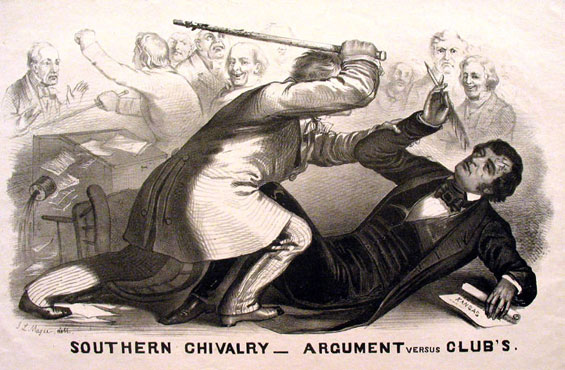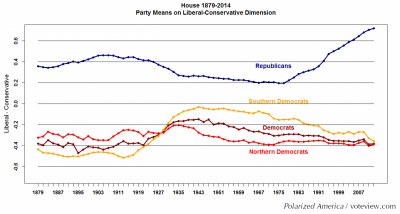 In his final State of the Union Address, President Obama closed with a forceful restatement of the central theme of his 2008 campaign, a call for hope and change that can reach across and heal our divided politics. This passage stuck out in particular:
In his final State of the Union Address, President Obama closed with a forceful restatement of the central theme of his 2008 campaign, a call for hope and change that can reach across and heal our divided politics. This passage stuck out in particular:
Democracy grinds to a halt without a willingness to compromise; or when even basic facts are contested, and we listen only to those who agree with us. Our public life withers when only the most extreme voices get attention. Most of all, democracy breaks down when the average person feels their voice doesn’t matter; that the system is rigged in favor of the rich or the powerful or some narrow interest.
Too many Americans feel that way right now. It’s one of the few regrets of my presidency — that the rancor and suspicion between the parties has gotten worse instead of better. There’s no doubt a president with the gifts of Lincoln or Roosevelt might have better bridged the divide, and I guarantee I’ll keep trying to be better so long as I hold this office.
First, it’s absolutely true that “democracy grinds to a halt…when even basic facts are contested.” We certainly see that around climate policy in general, which is probably one of the realms the President had in mind. It’s also true with evolution, where school board and state board of education races become battles over science and religion, leaving aside critical issues like the changing needs of science teachers as science advances and as the STEM workforce changes. Denial’s harmful effect on democracy is part of the reason NCSE’s work is so important!
Second, it’s absolutely false—5 Pinocchios!—that someone like “Lincoln or Roosevelt” could have bridged today’s partisan divide.
First, some key history: Lincoln was elected after over a decade of increasingly violent political battles, including the massacres of Bleeding Kansas, not to mention one member of Congress viciously beating another due to their differences over slavery. South Carolina’s legislature declared the mere fact of Lincoln’s election “a hostile act” and moved to secede from the Union even before he was sworn into office. Congress was not poised to grant Lincoln any mandate upon his election, though matters became substantially easier upon the exit of the elected representatives of states engaged in treasonous warfare upon their nation, and the commencement of hostilities by those traitors. Still, I hesitate to call Lincoln—or anyone accountable for Sherman’s march to the sea—an exemplar of effective bridgebuilding.
Roosevelt had an easier task. Hoover and his Republican Congress failed utterly to take any steps to stem the Great Depression, and matters were escalating. Grangers in some farm states affected by the Dust Bowl and the financial crisis assaulted bank agents and sheriffs executing foreclosures. An army of unpaid veterans marched on and occupied Washington, demanding early payment of a bonus promised for service in World War I. The election of 1932 swept Franklin Roosevelt into office with overwhelming support, and also delivered an overwhelming pro-Roosevelt electoral wave in Congress. He didn’t need to build bridges because voters had already put paid to his opponents. When conservative holdovers on the Supreme Court struck down New Deal policies, Roosevelt responded by threatening to pack the Court with sympathetic justices. Congress balked, but the Court got the message and a new judicial approach emerged. While Roosevelt got his way in the end, the moment is hardly an exemplar of political bridge-building.
 Estimates of the partisan makeup of Congresses since 1879, based on vote records. Estimates and graph by Howard Rosenthal and Keith Poole.
Estimates of the partisan makeup of Congresses since 1879, based on vote records. Estimates and graph by Howard Rosenthal and Keith Poole.Second, President Obama faced a deeper partisan divide than has existed in American politics since, arguably, the Civil War. Since the ‘90s, Democratic officials and Democratic voters have gotten more liberal, and Republican officials and voters have gotten way more conservative. (This is referred to as “asymmetrical polarization,” since Democrats have not polarized to the same degree that Republicans did.)
Most significantly for President Obama’s point, the Pew Research Center notes that “the most politically polarized [citizens] are more actively involved in politics, amplifying the voices that are the least willing to see the parties meet each other halfway.”
This also goes a long way toward explaining political inaction on climate change, and the persistence of creationism as a dominant force in American politics. Most Americans are not vigorously pro-evolution, and are not absolutely opposed to evolution either. As I’ve observed before, only a small fraction of Americans are dedicated to the proposition that the universe, the Earth, and life on Earth were created by divine fiat less than 10,000 years ago. Numerous surveys by the Yale Project on Climate Change Communication and the George Mason University Center for Climate Change Communication find that relatively few Americans take a firm denialist stance on climate change, and a comparably small number fall into the group that is most concerned about climate change. On both subjects, the political debate is dominated by those extremes. Asymmetrical polarization means that over time those most extreme views are increasingly correlated with a suite of other political views, making it harder to form novel political coalitions that might be able to advance some particular agenda despite the partisan divide.
Furthermore, the last few decades have seen America experience The Big Sort, a geographical realignment that parallels the asymmetrical polarization. People’s views aren’t just shifting to match those of their fellow partisans. Americans are increasingly moving to communities where people are more like themselves. This segregation means fewer opportunities for dialog across the (growing) partisan divide, and it makes it more likely that elected officials will represent a constituency that holds extreme views on key topics. Thus, even in a state with substantial support for teaching evolution, we could find individual school districts in which overwhelming creationist majorities elect creationist school boards which hire and tolerate creationist teachers.
The solution is not to await a President better at bridging partisan divides than Obama, Roosevelt, or Lincoln. We may as well wait for Godot. Instead, the challenge is to recognize this polarization, acknowledge it as a political reality, and incorporate it into our political tactics. And if we want to narrow that divide, people who fall away from the extremes need to raise their voices, and those of us with firm and polarized views need to find ways to elevate the voices of people whose views are (depending on your perspective) more nuanced or less clear.
For the latter, I can envision an example from the realm of evolution. Instead of setting the matter up as a debate between evolution and creationism, we need more panel discussions. And while such a panel might include an evolution-denying creationist for the sake of completeness, it would be far more interesting to have the proverbial priest, rabbi, and imam—an example that’s on my mind having just taped an interview with The Three Wise Guys radio show. The panel would ideally include scientists whose theological views represent the diversity within the scientific community. Such settings would give room for consensus, even agreement, to emerge, and nudge people watching and listening to think about the continuum of belief, to find a comfortable place in the middle that they can advocate for coherently.

